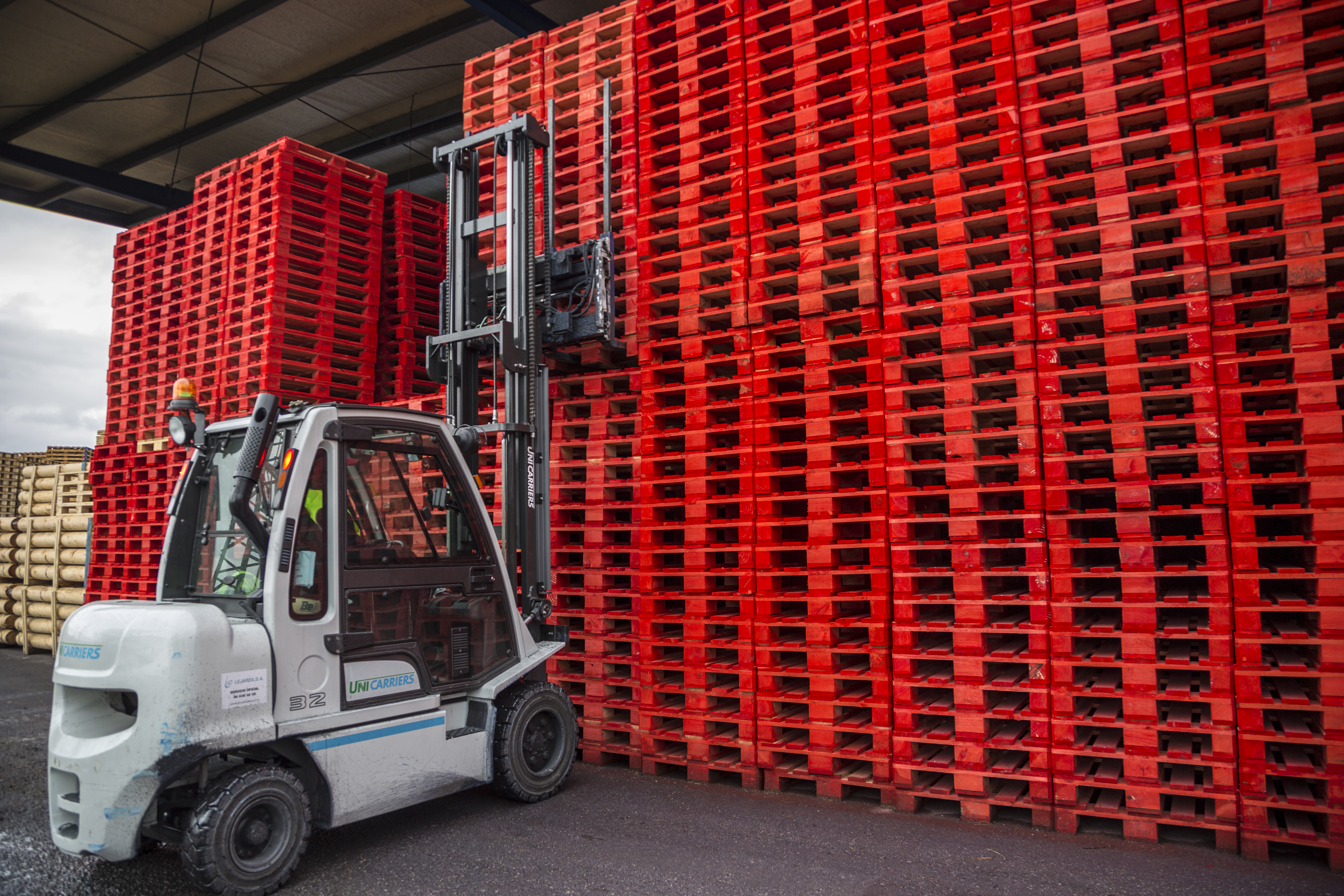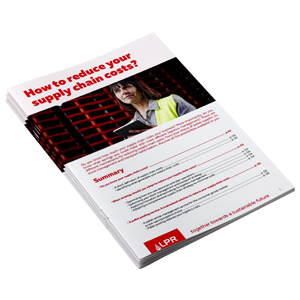Supply chain management is a crucial issue for all manufacturers who wish to improve their operational efficiency and profitability.
Effective pallet management is a critical aspect of logistics optimisation, and two common methods used by manufacturers are pallet pooling and pallet exchange.
However, there are significant differences between these two approaches.
So, what are the specific differences?
This article serves as a guide to help you choose the most suitable method for transporting your goods and enhancing the long-term efficiency of your supply chain.
Menu:
3 | Why pallet pooling is the best solution to make your supply chain more efficient?
1. What is pallet pooling?
1.1. A method based on pooling
Pallet pooling is a logistics process for renting and managing pallets.
The principle is simple: manufacturers outsource the management and supply of pallets to a company specialising in the management of pallet pools.
Once the pallets have been used by a customer, they are recovered by the pallet management company, repaired if necessary, then reinjected back into the pool.
This rotation system guarantees that all parties who utilise the services of a pallet rental company receive a consistent supply of the required number of high-quality pallets, exactly when they need them.
In short, this method allows manufacturers to outsource the management of their pallets and save resources, without compromising the efficiency of their supply chains.
1.2. The advantages of pallet pooling
Pallet pooling has both economic and ecological benefits for your supply chain.
a. A significant economic advantage
Based on a rental model, pallet pooling is an outsourced service that saves you from buying and managing your own stock of pallets.
It helps to eliminate the hidden costs that the purchase of pallets can often generate, such as:
-
Pallets that are left dormant at the end of the supply chain can result in additional storage expenses.
-
Carriers charge for the delivery of pallets on return trips, even when they don’t contain any goods.
-
Repair and destruction of pallets can be more costly when carried out by single organisations.
By choosing pallet rental, all these problems are solved or taken care of by the pallet pool management company.
b. Pallet pooling: a key partner in promoting the circular economy
- Pooling reduces the excessive use of natural resources like wood.
Thanks to the collection, sorting, and repair process, pallets are reused throughout their entire lifespan, which is approximately 5 years per pallet.
- When the pallets can no longer be repaired, they are generally recycled by the management company.
At LPR, our PEFC-certified wooden pallets are recycled into pellets for heating at the end of their life cycle.
-
A pooling-management company such as LPR possesses a network of service centres throughout Europe, enabling shorter delivery and collection journeys and ultimately reducing CO2 emissions.
-
All pallets circulating within the pool are compatible with standardised handling equipment.
The pallets injected into the pool are high-quality and suitable for automated production lines.
Consequently, automated solutions like palletisers can be utilised without risking any interruptions in the supply chain (such as pallet breakage).
Pallet pooling allows manufacturers to accelerate their transition to more environmentally responsible practices without compromising the efficiency of their supply chain.
2. What is pallet exchange?
2.1. Definition of pallet exchange
"Pallet exchange" is a logistics process in which two companies exchange their respective pallets during the delivery or receipt of goods.
Therefore, when goods are transported to the distributor, the carrier retrieves the empty pallets belonging to the recipient and exchanges them for the ones they delivered.
Please note: in this instance pallets must meet specific quality standards to be accepted for exchange. All damaged pallets need to be repaired by their owners before the transaction takes place.
2.2. Disadvantages of pallet exchange
a. Lack of logistical coordination
Pallet exchange requires perfect logistical coordination between all parties involved.
They need to ensure that the pallets being exchanged are in good condition and are also the correct size.
Otherwise, trucks cannot be immediately reloaded upon delivery, resulting in potential time losses and additional costs.
b. Unforeseen costs
Exchanged pallets can be damaged or lost during transport. Unforeseen events can lead to mounting additional costs for companies. Also the administrative costs of managing exchange pallets and their maintenance costs impact the profitability of your supply chain.
c. Shortages and lack of availability
Ultimately, the availability of pallets will be subject to the manufacturers' activity levels, as some companies may occasionally experience a shortage of pallets to send out compared to the goods they receive from their suppliers.
3. Why pallet pooling is the best solution to make your supply chain more efficient?
To summarise, pallet pooling involves outsourcing pallet management to a third-party company, while in pallet exchange, companies are responsible for managing their own pallets.
This is why we recommend that you use pallet pooling!
Your provider will ensure that you have a supply of high quality pallets, whenever you need them.
At LPR - La Palette Rouge, we take care of everything so that you can focus on your core business.
3.1. MyLPR: technology that benefits your supply chain
New technologies are a real asset for your supply chain, and we understand that!
You can easily control the movements of your pallets while keeping an eye on your invoices. MyLPR is:
-
a tool that makes ordering your pallets easier: the format, the quantity, the date, the place of delivery… you control everything.
-
a tool that enhances the transparency of your supply chain: analyse the movements of your goods (stock, orders in progress, shipment of pallets) from your account.
3.2. A supplier close to you
We have more than 32,000 collection points and 135 service centres across Europe.
As a result, we can repair and store pallets near our customers, facilitating swift deliveries and pallet recoveries.
We also optimise each trip to cover the fewest possible miles and exploit the full capacity of our trucks.
3.3. Red pallets at the service of sustainable development
Since 2010, our red pallets have been made of PEFC-certified wood.
A certification that assures you that the wood used in our entire range of pallets comes from sustainably managed forests.
PEFC certification ensures that the forest area is respected:
-
By preserving soils, fauna and flora and ensuring their regeneration
-
By choosing cutting periods that do not harm animal species (e.g. during mating seasons)
-
By ensuring regular renewal of the trees that make up the forest
In addition, as wood is the heart of our pallets, we have established a sourcing policy to ensure that our raw material supplies fall within the framework of sustainable development.
By using our simulator, you can assess the amount of CO2 reduction achieved through pallet rental-management.
Conclusion
As you have seen, pallet pooling management is a strategy that enables you to concentrate on the core of your supply chain with the assurance that your goods' movements are well managed and under control.
With this pallet management model, you can minimise unnecessary expenses related to pallet storage and transportation, and also eliminate the use of disposable pallets to reduce waste.
Ultimately, pallet pooling, with its circular management system, enables you to further embed your supply chain in sustainable development practices.
Are you interested in joining a pallet pool?
Our teams are available to assist you and ensure a smooth transition towards making the change. Contact us today!



